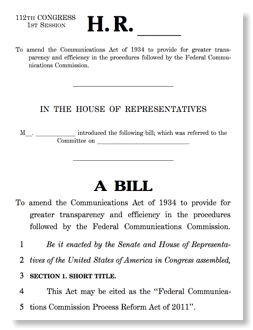Agreeing with CTIA: Eshoo Bill is Solution to Nonproblem
“We are concerned that the bill proposes to add a new layer of regulation to a new and exciting set of services, while ignoring the fact that wireless is an inherently complex and dynamic environment in which network speeds can vary depending on a wide variety of factors. Congress should resist calls to impose new regulations and instead focus on the real issue, which is making sure that America’s wireless carriers have sufficient spectrum to lead the world in the race to deploy 4G services.”
Readers may think your blogger has a hatred of CTIA because they are often criticized here. The criticism is because of a fundamental disagreement on several issue like prison jamming, information about cell phone safety, indifference to physical appearance of base stations in populated areas, and cell phone use while driving issues. But I admire many other positive aspects of CTIA and its activities.
In this case, CTIA and I agree on a new bill, “Federal Communications Commission Process Reform Act of 2011”. The House Subcommittee on Communications and Technology majority (Republican) staff have circulated this summary of the bills new provisions:
New section 5A(d)—Bipartisan Initiation of Items. Requires the Commission to establish procedures to allow a bipartisan majority of Commissioners to put an item on the Commission’s agenda.
New section 5A(e)—Publication of Reports and Ex Partes. Requires the Commission to seek comment on reports and establish procedures for giving the public an opportunity to evaluate ex parte filings before the Commission may rely on them.
New section 5A(f)—Pending Item Publication. Requires the Commission to establish rules regarding the publication of a list of the draft items the commissioners are currently considering.
New section 5A(g)—Shot Clocks. Requires the Commission to establish shot clocks for each type of proceeding it oversees.
New section 5A(h)—Release of Documents and Reports. Requires the Commission to release reports according a schedule it has established, and all orders within seven days of adoption. The Commission must report to Congress whenever it misses its own deadlines.
New section 5A(i)—Biannual Scorecard. Requires the Commission to report every six months regarding its progress meeting its shot clocks.
New section 5A(j)—Transaction Review Reform. Preserves the Commission’s ability to review transactions but requires conditions to be: (a) narrowly tailored to remedy harms that arise as a direct result of the transaction and (b) requirements that the Commission could otherwise impose under its rule making authority. The same requirements apply to “voluntary” commitments.
New section 5A(k)—Communications Marketplace Report. Requires a biennial report to Congress giving a big-picture view of what’s happening in the industry, the challenges for jobs and economic growth, and the Commission’s agenda to address those issues.
The FCC’s actions are governed by the same Administrative Procedures Act and Government in Sunshine Act as the rest of the federal government, including the other regulatory Commissions. Many of these issues are addressed under existing legislation that is not followed particularly well. What is the need for FCC exceptionalism here?
I am sorry Comm. Copps is so upset about the Government in Sunshine Act. But the Commission under present laws and regulations have the authority to meet privately to discuss certain topics. There has not been such a closed meeting in nearly a decade. The comity among commissioners thus is not a result of the current law but of a major breakdown on the 8th Floor that can not be legislated away.
The one point I would agree with is the “shot clock” issue. The Commission has consistently ignored Section 7 of the Communications Act ever since it was passed in 1983, while it does have a “shot clock” for corporate mergers which have no legal deadline.




![Validate my RSS feed [Valid RSS]](valid-rss-rogers.png)

